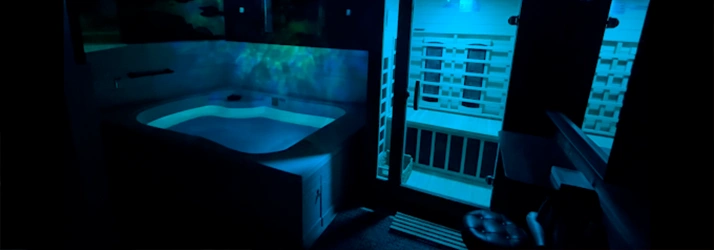Cold Plunge Therapy in Doylestown PA

Cold plunge therapy in Doylestown PA, also known as cold water immersion or ice bath therapy, involves submerging the body in cold water for a set period of time, usually ranging from a few minutes to around 10-15 minutes, with water temperatures typically between 50°F (10°C) and 59°F (15°C). This form of therapy is popular among athletes, wellness enthusiasts, and those seeking recovery and mental health benefits.
Key Benefits of Doylestown PA Cold Plunge Therapy:
- Reduces Inflammation and Muscle Soreness: One of the primary reasons athletes use cold plunge therapy is its ability to reduce inflammation. Cold water constricts blood vessels (vasoconstriction), reducing swelling and inflammation in muscles and joints, especially after intense physical activity. It also helps to minimize delayed onset muscle soreness (DOMS), which can occur after strenuous exercise.
- Speeds Up Muscle Recovery: Cold exposure helps flush out metabolic waste like lactic acid from muscles while boosting circulation when the body warms up again. This improved blood flow aids in muscle recovery, making cold plunges a favorite for athletes and individuals recovering from physical exertion.
- Boosts Circulation: When you immerse in cold water, your body works to maintain core temperature by increasing blood flow to vital organs. After leaving the cold plunge, your blood vessels dilate (vasodilation), which improves overall circulation, delivering oxygen and nutrients to muscles and tissues for faster healing.
- Elevates Mood and Reduces Stress: Cold water immersion stimulates the production of endorphins, the body’s natural "feel-good" hormones, which can improve mood, reduce stress, and increase overall mental clarity. The sudden cold exposure can also trigger the release of norepinephrine, a hormone that helps manage stress and improve focus.
- Boosts Circulation: When you immerse in cold water, your body works to maintain core temperature by increasing blood flow to vital organs. After leaving the cold plunge, your blood vessels dilate (vasodilation), which improves overall circulation, delivering oxygen and nutrients to muscles and tissues for faster healing.
- Elevates Mood and Reduces Stress: Cold water immersion stimulates the production of endorphins, the body’s natural "feel-good" hormones, which can improve mood, reduce stress, and increase overall mental clarity. The sudden cold exposure can also trigger the release of norepinephrine, a hormone that helps manage stress and improve focus.
- Boosts Immune Function: Some studies suggest that cold plunge therapy may enhance immune function by stimulating the production of white blood cells and increasing antioxidant levels. The regular practice of cold water immersion has been associated with a more resilient immune system.
- Enhances Mental Toughness and Focus: Cold plunge therapy is often seen as a mental challenge. Regularly subjecting yourself to the discomfort of cold water can help build mental resilience and fortitude. Many users report increased focus, discipline, and emotional regulation as a result of incorporating cold plunges into their routine.
Cold Plunge Spa Science
Recover Cold Plunge
How to Perform Cold Plunge Therapy:
- Prepare the Cold Plunge: Fill a tub or cold plunge pool with water and ice until it reaches the desired temperature, usually around 50-59°F (10-15°C). Make sure you have a thermometer to monitor the water temperature.
- Immerse in the Cold Water: Slowly submerge your body, focusing on controlled breathing to manage the initial shock of the cold. You may start by immersing just your legs and arms, eventually working up to full submersion (minus the head if desired).
- Stay for 1-5 Minutes: Begin with shorter sessions of 1-3 minutes, especially if you’re new to cold exposure. Over time, you can gradually increase your tolerance and aim for 5-10 minutes.
- Warm Up Afterwards: After completing your cold plunge, dry off and warm your body with gentle movements, stretching, or light clothing. It's important to avoid using hot showers immediately after, as this can counteract the circulatory benefits.
Cold plunge therapy offers a wide range of physical and mental benefits, from faster muscle recovery and reduced inflammation to improved mood and resilience. Whether you're an athlete or just looking to improve your overall wellness, cold water immersion can be a powerful tool when practiced safely
OFFICE HOURS
Monday
10:00am - 7:00pm
Tuesday
10:00am - 7:00pm
Wednesday
10:00am - 7:00pm
Thursday
By Appointment Only
Friday
10:00am - 5:00pm
Saturday
10:00am - 5:00pm
Sunday
10:00pm - 3:00pm
Recover Cold Plunge Contrast Therapy Float Spa and Infrared Sauna
906 Town Center
Doylestown, PA 18901









